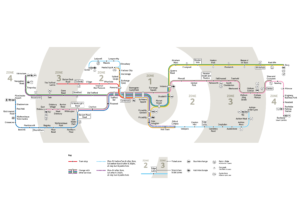Interview: Mike Berners-Lee on why there is no Planet B
Mike Berners-Lee is a writer and sustainability expert at Lancaster University researching the global food system and climate change.
He spoke with Environment Journal about his new book There Is No Planet B: A Handbook for the Make Or Break Years and why he believes critical thinking and universal respect for all people will be vital in tackling climate change.
What inspired you to write There Is No Planet B now?
It became increasingly clear that if we really want to deal with climate change we need to see it as a symptom of something bigger that is going on; that humans have suddenly become so powerful that unless we radically improve the quality of our stewardship of the planet we will get ourselves into enormous trouble.
It is not totally new that we have been degrading the environment, but what is new is that if we don’t change our was very quickly we are likely to have a catastrophe. This is a new context for humanity to be operating in. Some people use the word Anthropocene to describe it.
In this new context, the challenges we face are global and so interrelated that we need a holistic and un-siloed response if our response is going to be effective. So this book is my attempt to look at the big picture of everything that matters – in a robust but accessible way.
The book describes itself as a ‘handbook’ intended for a wide audience and is laid out in bite-size chunks. How much do you think the issues we face need explaining simply?
The art of communication is to make complex things simple without being simplistic. We need a way of understanding what’s going on that we can hold in our heads in its entirety while we make decisions. And we all need to understand this stuff as best we can.
So my book is aimed at academics, politicians, business people and the general public alike. And it is deliberately fun whilst being deadly serious because somehow we have to learn to have fun whilst saving the world. That is the most effective way.
The book is quite wide-ranging, covering specific issues such as food and energy to more abstract concepts like values, truth and trust. Are the issues we face more than just environmental?
If only climate change, biodiversity and the other environmental challenges that we face were simply questions of science and technology. The book gets into wider issues, because if we actually want to solve problems, they are essential dimensions to take very seriously.
Early on, you outline the values of the book, one being that all people are treated as having intrinsic equal value. That seems quite radical in our current political climate – how important do you think that is to solving our problems?
Like it or not we are all one tribe now on this beautiful Planet A. We affect each other in everything we do. The idea that one country can thrive whilst others suffer the consequences of climate change lacks imagination as to how a global crisis would unfold.
So we suddenly need to treat each other with equal respect, even if we are not used to doing so, or wouldn’t bother to do so if we had not arrived in the Anthropocene.
Many of the issues outlined in There Is No Planet B are due to human behaviour. How do you think we can change these behaviours?
We need to see a systemic change in the way humans operate. One essential dimension of this is cultural and behavioural. The change, when it comes, will come from everywhere at once. Politics, economics and cultural norms will probably all flip together.
To make that happen we need to be pushing on all these fronts now; creating the conditions under which the big system change becomes possible.
The book recognises the planet’s growing lack of biodiversity, as well as the climate crisis. What do you think of movements like Extinction Rebellion which raise awareness of this issue?
I am very impressed by XR. I wasn’t sure that I would be, but I think they have been extremely impressive so far. The values they operate from are identical to those I call for No Planet B; universal respect for all people, respect for the environment and respect for truth. And they insist on these at every turn.
Through citizens assemblies, they also push for an evolution in our democracy towards a more thoughtful, informed and inclusive decision making.
The final section of the book is on thinking skills. How do you think clearer thinking can help us solve the situation we’re in?
Our technical genius has taken us into a situation in which we now need a new set of complementary skills in order to get by. Some of these relate to systems thinking; the ability to stand back and see the big picture, and look at things in transdisciplinary ways.
Other relate to our imagination; the capacity to empathise with people on the other side of the world and to see further into the future. Others still relate to our ability to spot the difference between fact and fiction – in others though critical thinking but also in ourselves through self-reflection. These are all skills that we’ve been able to get away with not being to great at, but now we urgently need to raise our game.
How hopeful are you that we can avert the climate and ecological crisis we face in the limited timeframe we have?
I’m optimistic in as much as it is not proven that humans have to experience a catastrophe, even though it is clear that we are currently heading that way fast.
I’m optimistic in that the last few months have seen humans waking up more than ever before. It is not early enough, but if we all push hard this really could be the start of the huge change that we need – and it really might not be too late.














